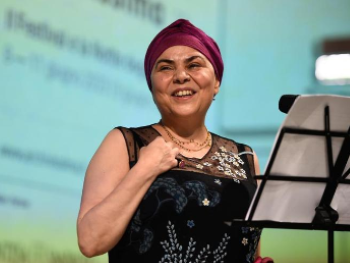
Michela Murgia was born on June 3, 1972, in Cabras, Sardinia, a region that deeply influenced her literary and personal identity. Growing up in a working-class family, Murgia's early life was shaped by the unique cultural landscape of Sardinia, which later became a central theme in her work. Her mother, Costanza Marongiu, who instilled in her a strong sense of justice and empathy, played a crucial role in shaping her worldview. Michela’s connection to her Sardinian roots was evident in her writing, where she often explored the tension between tradition and modernity.
Michela Murgia's relationship with her father, Antonio Murgia, was a complicated one, often described as strained. In interviews and her writings, Murgia spoke about her father's authoritarian nature and how it shaped her views on family and authority.
Murgia’s father was abusive, and his authoritarian behavior created a hostile environment at home. When she was just a child, her mother took the difficult but brave decision to leave the household, taking her children with her to escape the violence. This act of defiance against a controlling and violent husband had a profound impact on Murgia's worldview.
This experience significantly shaped Murgia's understanding of power, control, and the oppressive nature of patriarchal family structures. It was also a catalyst for her feminist views, particularly her commitment to addressing domestic violence and gender-based oppression. In interviews, Murgia often reflected on how her early experiences of family violence led her to become more empathetic toward women in similar situations, reinforcing her belief in the importance of challenging patriarchal norms and advocating for women's rights.
Michela Murgia's educational journey was marked by a strong intellectual curiosity and a passion for learning. After completing her secondary education, she pursued studies in theology. Though she did not complete her formal theological education, her deep engagement with religious themes became a hallmark of her literary work, particularly in novels like Accabadora, which won the prestigious Premio Campiello in 2010.
The Premio Campiello is a prestigious annual Italian literary award. It operates through a two-tiered selection process. First, a jury of literary experts (known as the giuria di letterati) reviews books published annually and selects five finalists in a public hearing. These finalists are known as the Premio Selezione Campiello. The final winner is then determined by a separate jury of 300 readers (giuria dei 300 lettori), drawn from diverse social, cultural, and professional backgrounds across Italy, with each member casting one vote.
Since 2004, the literary experts' jury has given an additional award, the Premio Campiello Opera Prima, to recognize the best debut work.

Murgia's early career was as varied as her intellectual pursuits. She worked as a religion teacher, an experience that provided her with unique insights into the intersection of faith, culture, and identity. These experiences enriched her understanding of human nature and societal norms—themes she would later explore in her writing. Her debut novel, Il mondo deve sapere (The World Must Know), published in 2006, was a satirical exposé of the call center industry, and it immediately marked her as a writer with a keen eye for social critique.
Michela Murgia's most celebrated work, Accabadora, delves into the life of an elderly Sardinian woman who serves as an accabadora—a traditional figure believed to help the terminally ill pass away. The novel is a poignant exploration of life, death, and the moral complexities of human existence. Set against the backdrop of post-war Sardinia, the book intertwines themes of tradition, autonomy, and the silent power of women in patriarchal societies. Accabadora was widely acclaimed for its lyrical prose and deep philosophical insights, earning Murgia both national and international recognition.
Beyond her literary achievements, Michela Murgia was a passionate activist. She was known for her fierce advocacy for marginalized groups including women, the LGBTQ+ community, and immigrants. Murgia's activism was rooted in a profound sense of justice and a commitment to dismantling oppressive structures. She used her public platform to speak out against issues such as gender-based violence, homophobia, and the rise of neo-fascism in Europe. Her public speeches, essays, and participation in political debates made her a formidable figure in contemporary Italian society.
Michela Murgia was a prominent feminist who actively participated in the feminist movement in Italy and beyond.
Her feminism was deeply embedded in both her personal and professional life. She was an outspoken advocate for women's rights, consistently using her platform to challenge patriarchal structures and support gender equality. Murgia often participated in feminist events and public debates, where she highlighted the importance of dismantling traditional gender roles that constrained women's freedom and autonomy.
One of the most notable instances of her feminist activism was her involvement in the 2017 Women’s March in Rome, where she spoke out against gender-based violence and the systemic oppression of women. Murgia also participated in several conferences and panels discussing feminist issues, including the annual "Feminism in Rome" festival, where she engaged with other prominent feminists to address contemporary challenges facing women in Italy and worldwide.

The contemporary challenges often discussed by Michela Murgia and other feminists included issues such as gender-based violence, reproductive rights, workplace inequality, intersectionality, and cultural sexism. Gender-based violence, including domestic abuse, sexual harassment, and femicide, was a major concern, with advocates like Murgia calling for stronger legal protections and better support systems for survivors. Reproductive rights were also at the forefront, as access to abortion in Italy, while legal, remained difficult due to the high number of conscientious objectors among healthcare providers. Workplace inequality, including the gender pay gap, job insecurity, and the underrepresentation of women in leadership, was another critical issue, with many women still facing discrimination despite legal protections. Murgia also emphasized the importance of intersectionality, recognizing that women’s experiences of oppression were further complicated by race, class, and sexual orientation, which led her to advocate for LGBTQ+ rights and challenge societal norms that marginalized these communities. She frequently critiqued the cultural and institutional sexism that perpetuated stereotypes, limited women's roles in society, and contributed to their underrepresentation in politics and leadership positions.
Murgia’s feminist views were frequently expressed in her writing and public statements. She regularly contributed to Italian newspapers and magazines, where she penned essays on topics such as reproductive rights, domestic violence, and the importance of intersectional feminism. In interviews, Murgia often emphasized the need for solidarity among women and the importance of creating spaces where women's voices could be heard and valued.
In her 2018 book Istruzioni per diventare fascisti (Instructions on How to Become a Fascist), Murgia highlighted the dangers of authoritarianism and its inherent connection to patriarchal power structures. Through satire, she warned of the creeping influence of fascist ideologies that sought to undermine women’s rights and reinforce traditional gender roles.
Murgia’s feminism also came through in her personal life. Openly bisexual, she often spoke about the challenges of being a woman in a society that still held conservative views on sexuality. Her willingness to discuss her own experiences was a powerful act of visibility and resistance, encouraging other women to embrace their identities and fight against societal norms that sought to marginalize them.
Her activism extended to mentoring younger women writers and activists, providing them with guidance and support as they navigated the often hostile landscape of public life. Murgia believed in the power of collective action and often collaborated with feminist organizations to amplify their efforts in advocating for gender equality.
Michela Murgia’s feminism was not just theoretical; it was lived, practiced, and shared. Her contributions to the feminist movement in Italy were significant, and her legacy continues to inspire women to challenge oppression and fight for their rights.
Michela Murgia’s life was tragically cut short when she passed away from cancer on August 10, 2023. Despite her illness, she remained active in public life until the very end, continuing to write, speak, and advocate for the causes she believed in. Her death was widely mourned, not only in Italy but around the world, as people recognized the loss of a powerful voice for justice and equality.
Murgia’s legacy lives on through her literary work and the lasting impact of her activism. She remains a source of inspiration for writers, activists, and all those who believe in the power of words to effect change. Her story is one of courage, intellect, and unwavering commitment to the pursuit of a more just and compassionate world.
Why Did I Choose to Research Michela Murgia?
Michela Murgia’s life and work resonate with me deeply. Her courage to challenge societal norms, her commitment to justice, and her ability to blend literary art with political activism are incredibly inspiring. Murgia’s story motivates me to use my voice to advocate for the rights of marginalized communities and to never shy away from speaking out against injustice. Her life serves as a powerful reminder of the impact that one individual can have in creating a more equitable and compassionate society.
Works Cited
Murgia, Michela. Accabadora. Einaudi, 2009.
Murgia, Michela. Istruzioni per diventare fascisti. Einaudi, 2018.
Parini, Giorgio. "Michela Murgia's Legacy: Literature and Activism." Journal of Contemporary Italian Studies, vol. 29, no. 4, 2023, pp. 210-225
Rossi, Laura. "The Impact of Michela Murgia on Italian Feminism." Women's Studies Quarterly, vol. 52, no. 1, 2024, pp. 98-113.
Sardo, Helena. "Remembering Michela Murgia: A Voice for the Marginalized." Italian Review, vol. 36, no. 2, 2023, pp. 45-50.
This article was published on 10/28/24